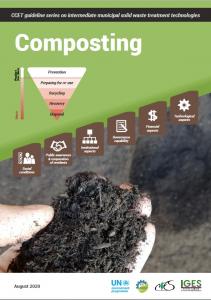This Composting Guideline was prepared by the researchers from the National Institute for Environmental Studies (NIES) and the Institute for Global Environmental Strategies (IGES) focusing on the introduction of composting projects based on source separation of organic waste and aerobic fermentation at plants for Municipal Solid Waste (MSW) management in the cities of developing Asia. It also aims to assist decision-makers and policy-makers at the local level, who have limited or no technical background on composting, to evaluate the feasibility of introducing composting projects as an appropriate strategic option for improving waste management. Based a holistic understanding about composting systems including both advantages and disadvantages, this simple, user-friendly, evidence-based guideline provides both technical and nontechnical aspects of planning sustainable composting projects.
The Composting Guideline is part of the Guideline Series that has been developed by the IGES Centre Collaborating with UNEP on Environmental Technologies (CCET) and the United Nations Environment Programme International Environmental Technology Centre (UNEP IETC) in collaboration with NIES and the Japan Society of Material Cycles and Waste Management (JSMCWM) with financial support from the Government of Japan aiming to assist policy-makers and practitioners at both national and municipal levels in developing countries in selecting appropriate waste management technologies and executing related policies and strategies to improve their waste management systems.

